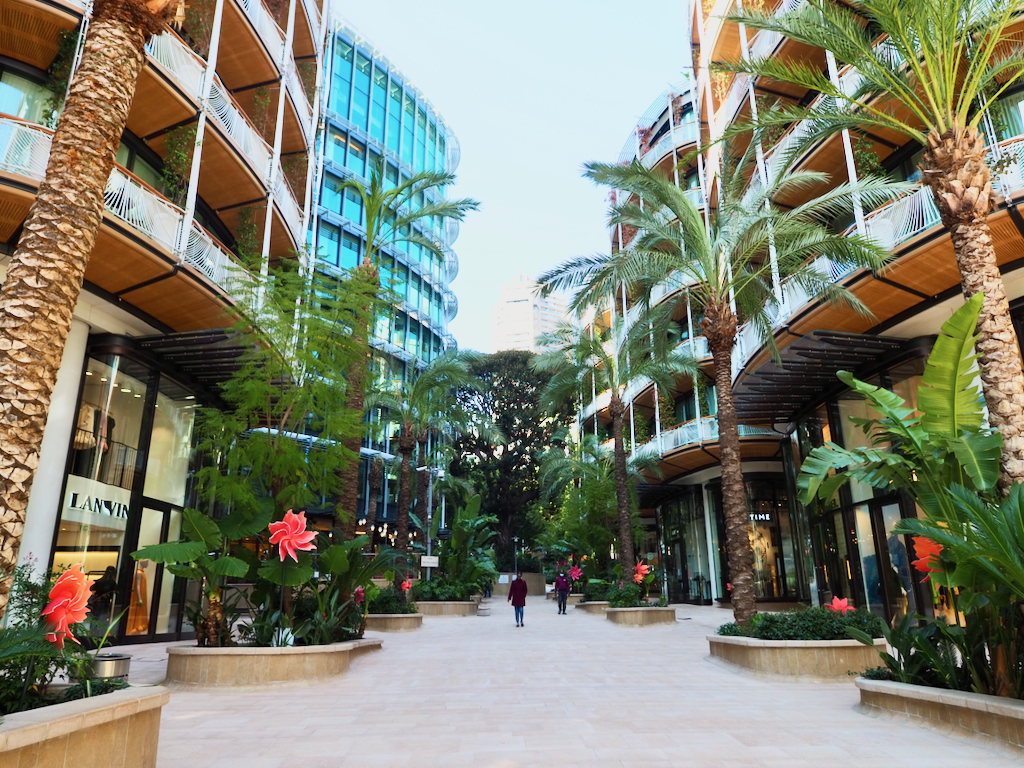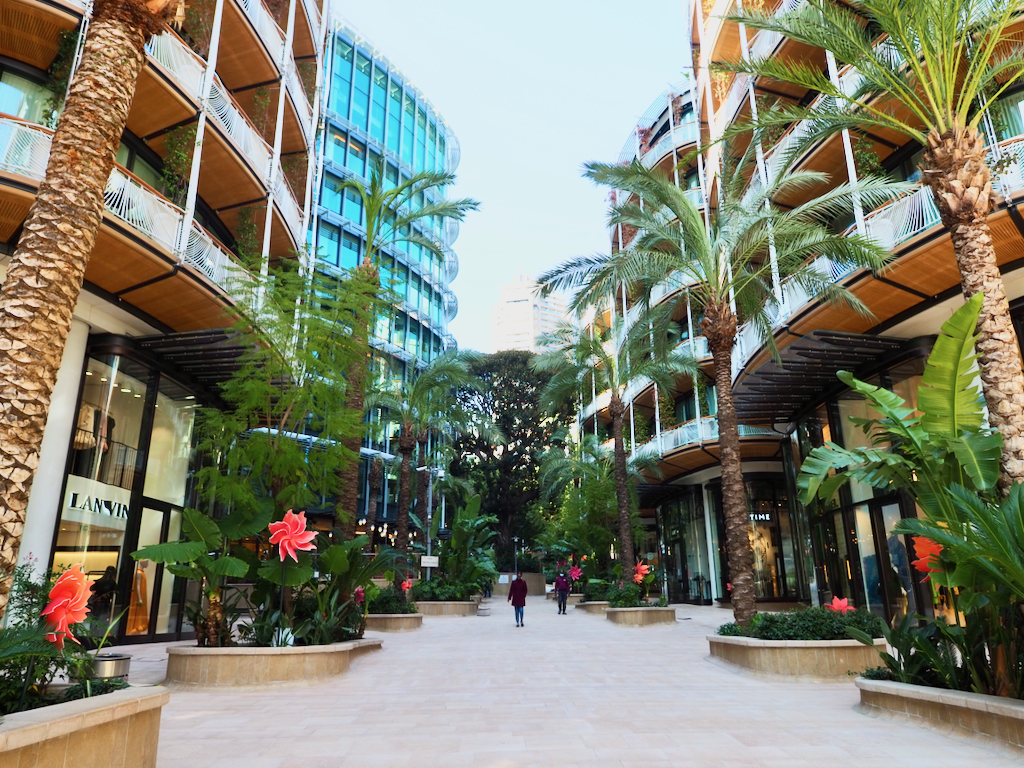
Columbia Hillen
Among the glistening chandeliers, gleaming marble columns and art nouveau frescoes of Hôtel de Paris Monte-Carlo, there’s a strange little bronze horse perched on a plinth at the entrance.
Though well designed, this charming sculpture has a single obvious defect – the veneer on its right front leg is almost completely worn away.
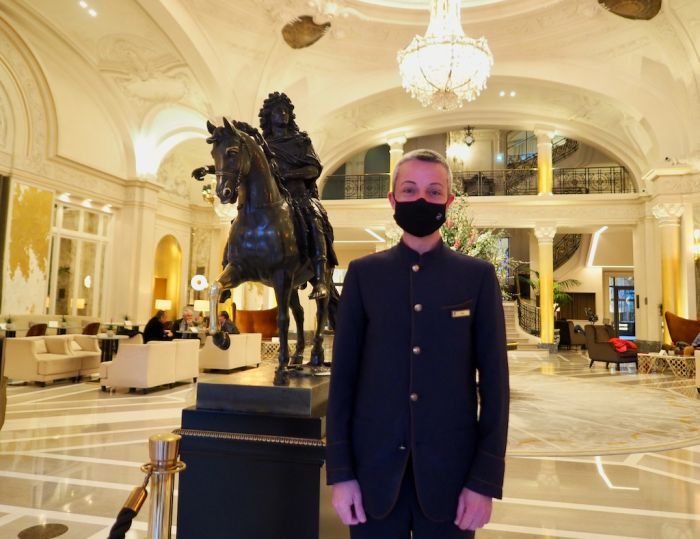
Long-time loyal doorman Eric and his four-footed companion, Lucky. Photo by Columbia Hillen
Why would a five-star hotel with an illustrious history dating back to the halcyon Belle Époque era of the mid-19th century have a seemingly defective work of art in such a prominent place plum in the middle of its lobby? In a hotel so well known that not one, but two James Bond movies have been filmed here.
Meet ‘Lucky,’ the handsome equine mascot, whose location and nickname become abundantly clear after learning more about the development of Monte Carlo itself, a compact town only a quarter of a kilometer in area in Monaco, itself only two square kilometers in size, on the French Riviera.
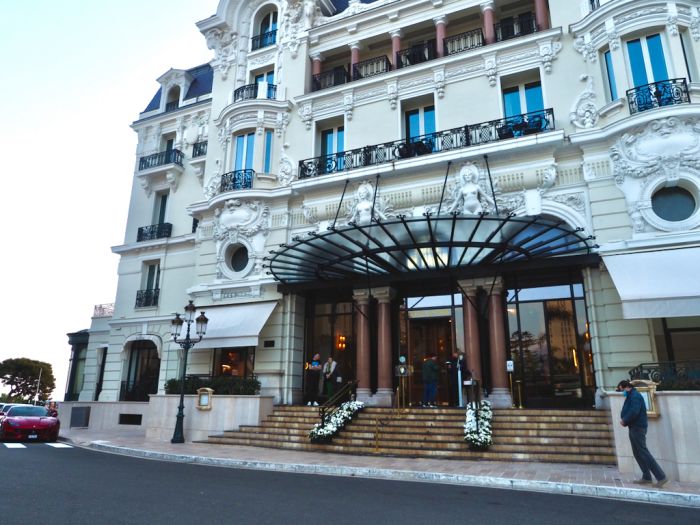
Impressive facade with belle Epoque and art nouveau styles. Photo by Columbia Hillen
Finding himself short of money in the mid-1800s, Charles III, Prince of Monaco, urged on by his mother, decided gambling was the best way to attract international free-spending high-rollers to bolster the local economy. So, he opened a casino, which later became known as Casino de Monte-Carlo, today one of the most famous gambling venues in the world. A suitably lavish hotel was, of course, required to accommodate the rich and influential – thus the eventual development of Hotel de Paris.
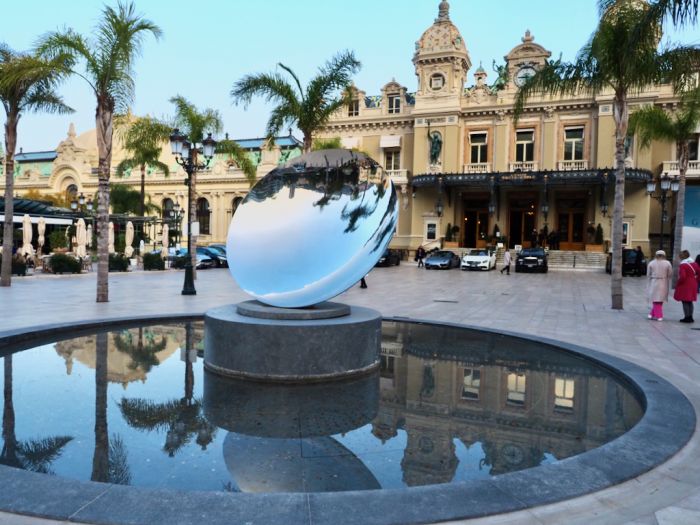
Legendary Casino Square. Photo by Columbia Hillen
As for Lucky, he claims pride of place in the hotel’s lobby due to popular belief that stroking his leg creates the necessary good fortune required at the blackjack, roulette and poker tables a mere fifty meters away in Casino Square.
Stroked daily by tens of thousands of hopeful gamblers for more than a hundred years, it’s a wonder his leg hasn’t simply fallen off.
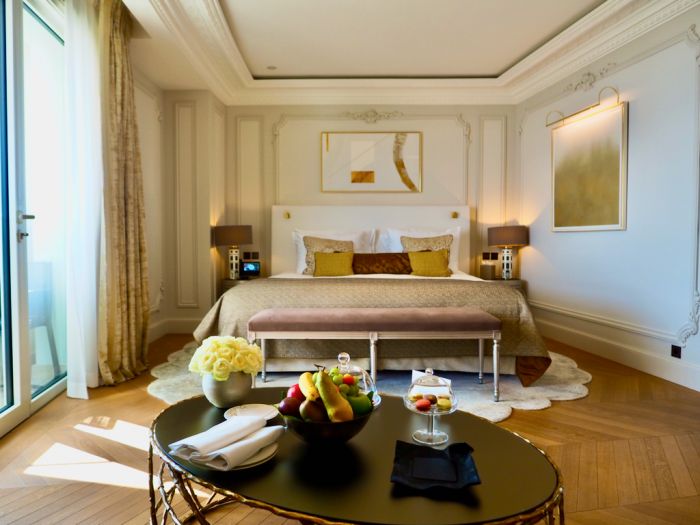
Suite 618 bathed in natural light. Photo by Columbia Hillen
While my companion and I didn’t tempt luck at the gambling tables, we did enjoy a two-night stay in a sixth-floor suite (618) at the hotel with terrific views over the the casino, Cafe de Paris beside it and the yacht-filled Mediterranean port, a five-minute walk away.
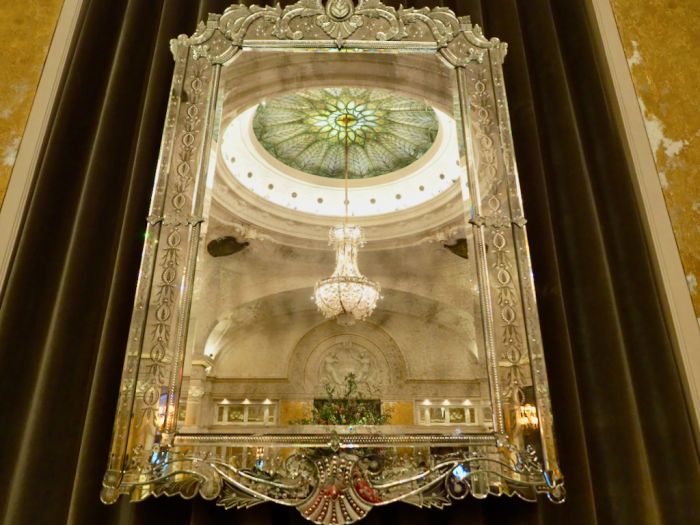
Reflections of beauty inside the lobby. Photo by Columbia Hillen
The hotel’s lobby is an attractive one, best enjoyed seated inside at marble-topped tables on comfortable armchairs, cocktail in hand, admiring the artistic skills that created it.
High above is a decorative glass-ceiling dome featuring classic art nouveau symbolism – plants, herbs, ornamental tortoise shells, starfish, even a pair of mermaids. A crystal chandelier hangs above a large bouquet of flowers in a vase on a polished walnut table. Silver-framed smoked mirrors and columns painted in gold around the lobby add to the opulent nature of the ambience. Live jazz takes place here in the evenings in the American Bar, just inside the entrance, a tempting post-dinner option.
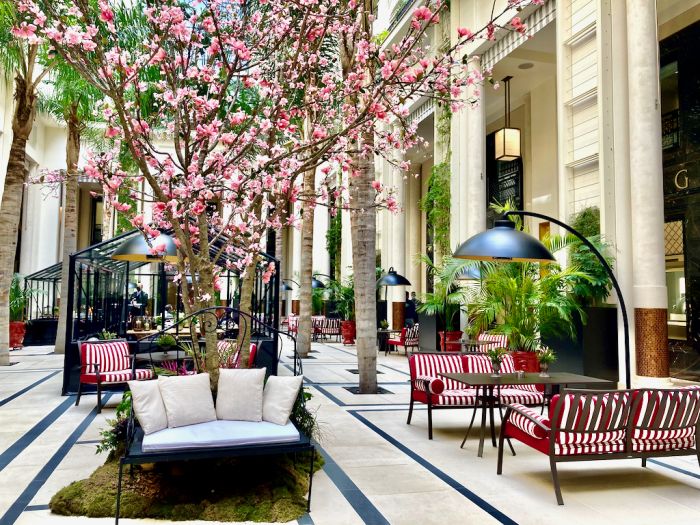
Colorful interior garden, perfect for coffee and idle conversation. Photo by Columbia Hillen
Nearby, there is an interior garden, known as ‘Jewellers’ Courtyard,’ designed in the style of Paris’s Place Vendôme and comprising palm trees, exotic foliage, marbled colonnades and chic cafes and shops such as Harry Winston and Graff.
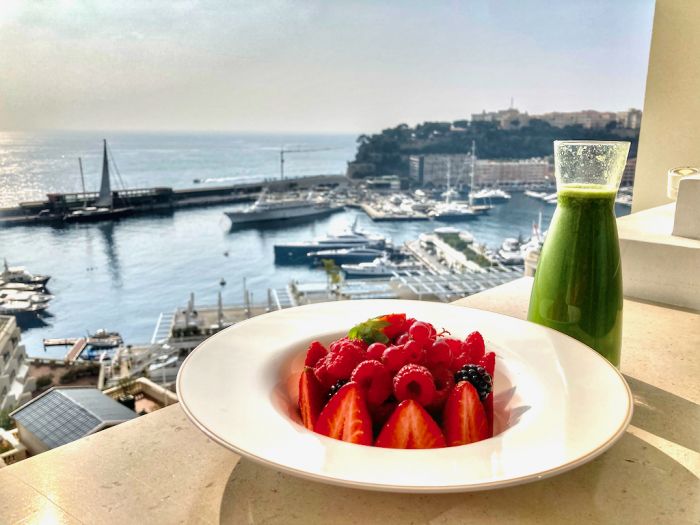
View from Suite 618 over Monte Carlo harbor. Photo by Columbia Hillen
Our suite, classic in design, featured ceiling mouldings, modern paintings, a walk-in-wardrobe and a black and gray marbled bathroom, with separate bath and shower plus a double sink. And best of all, a balcony with views over the Monte Carlo bay.
There were several highlights we enjoyed at Hotel de Paris, an historic landmark that underwent a five-year, 650 million euro renovation that finished in 2019.
One was enjoying a chat with friendly managing director, Ivan Artolli, whose high-level career in international hospitality means he has many delightful anecdotes to tell. If you meet him, ask him how he got his name.
Another highlight was its 75,000 square feet, four-level spa, the Thermes Marins Monte-Carlo, with panoramic views over Port Hercule. Complete with spacious circular pool, it also has a gym, sauna, steam room and an outside jacuzzi. Fitness classes take place daily including aerobics, tai chi, spinning and aquaerobics. Body and facial treatments are plentiful at the spa with ayurveda, reflexology, shiatsu, Thai massage and thalassotherapy listed on the menu. We indulged in rejuvenating Swedish massages performed by Nathalie Armingeat and Richard Mardon.
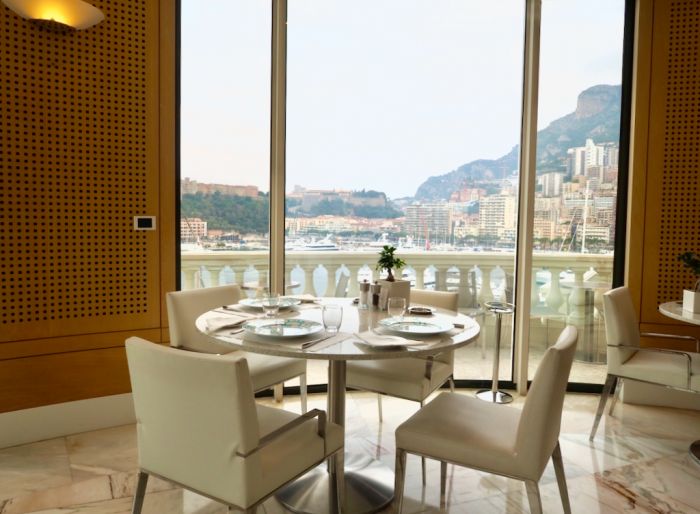
Hirondelle restaurant offers fine views over Port Hercule. Photo by Columbia Hillen
The spa even has its own restaurant, the Hirondelle, where we lunched healthily on a poke bowl of quinoa, marinated salmon with oriental spices, avocado, cucumber, ginger, seaweed and carrot, lentil soup and grilled sea bream with vegetables. A menu of detox juices include ginger, green beans, kohlrabi, carrots and daikon. As for dessert, we simply couldn’t resist the crème brûlée with pistachio and raspberry and the chocolate egg with poached pear.
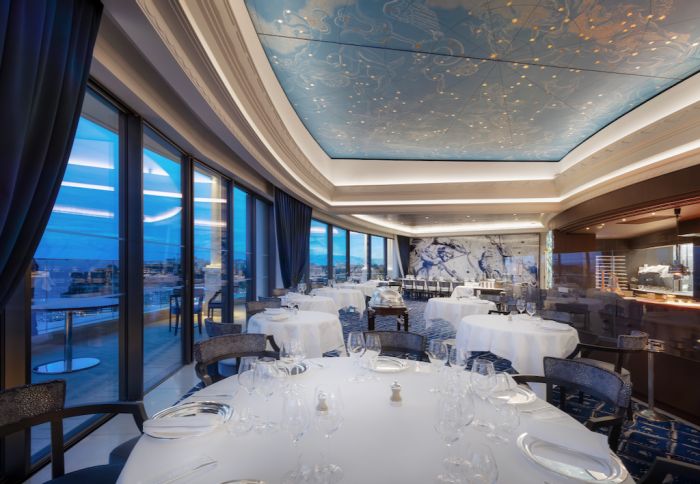
Top-floor Le Grill – with panoramic views over the ocean. Photo courtesy of Hotel de Paris.
Another highlight for us was dinner in the hotel’s top-floor Le Grill, with its sliding roof and wonderful window views over the Mediterranean. Under a ceiling adorned with zodiac signs and a wall painting of Cupid drawing her bow, we enjoyed an amuse bouche of broccoli purée with cream cheese, white of the egg and herbs followed by artichoke and truffle ravioli and confit and magret of tender Challans duckling – smoked on site with Provence herbs – with dessert being the restaurant’s iconic soufflé with lychee and rose. Our sommelier, Fabrice, paired our wines skilfully – a complementary trio of Sancerre, Vacqueyras and Minervois Syrah Shyla.
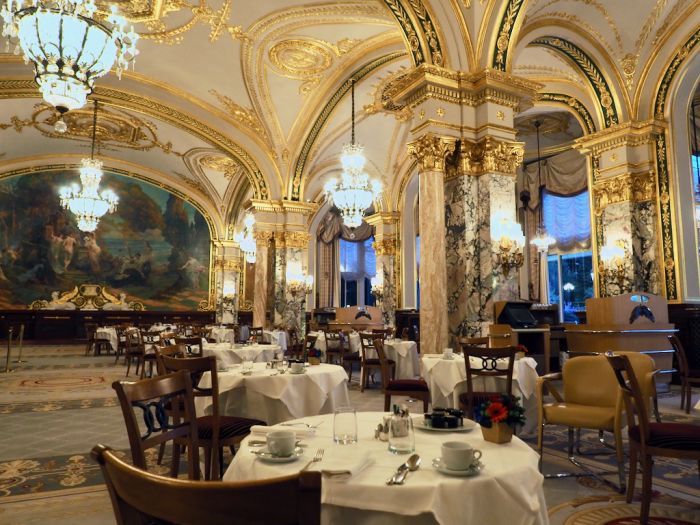
Salle Empire – a truly royal setting for breakfast. Photo by Columbia Hillen
Breakfast was also an occasion we savored, specially the elegant ambience of Salle Empire, a splendid dining room complete with 40-foot-high ceilings, soaring arches painted black and gold and views over the swaying palm trees on Casino Square.
Now owned by a public company, entitled, ‘Society of Sea Baths and of the Circle of Foreigners in Monaco,’ in which the government of Monaco and the ruling royal family have a majority interest, Monte Carlo has grown exponentially since its inception in 1863. Expansion includes other hotel options such as the belle-époque Hotel Hermitage, where we enjoyed afternoon tea and One Monaco, a blend of apartments, restaurants and cafes and a shopping center chockablock with designer names.
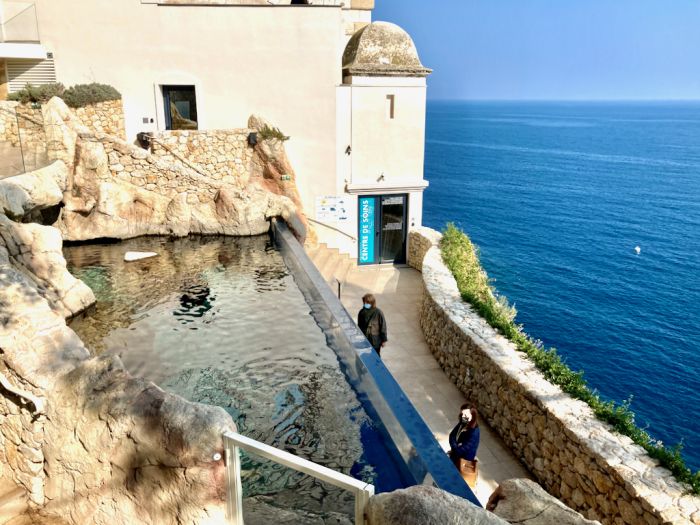
Oceanic Museum overlooks Mediterranean Sea. Photo by Columbia Hillen
Aside from gambling, dining and shopping, Monaco also has some interesting sights to explore. The Oceanic Museum, which towers over a sheer cliff face, is home to exhibitions and collections of sea fauna such starfish, seahorses, turtles, jellyfish, crabs, lobsters, rays, sharks, sea urchins, sea cucumbers, eels and cuttlefish and a variety of sea related objects, including model ships, sea animal skeletons, tools and weapons. Four thousand species of fish and over 200 families of invertebrates can be seen. It also features a presentation of Mediterranean and tropical marine ecosystems.
One can also visit the state apartments of the 13th century Prince’s Palace in Monaco with its intricate frescoes, tapestries and ornate furnishings.
